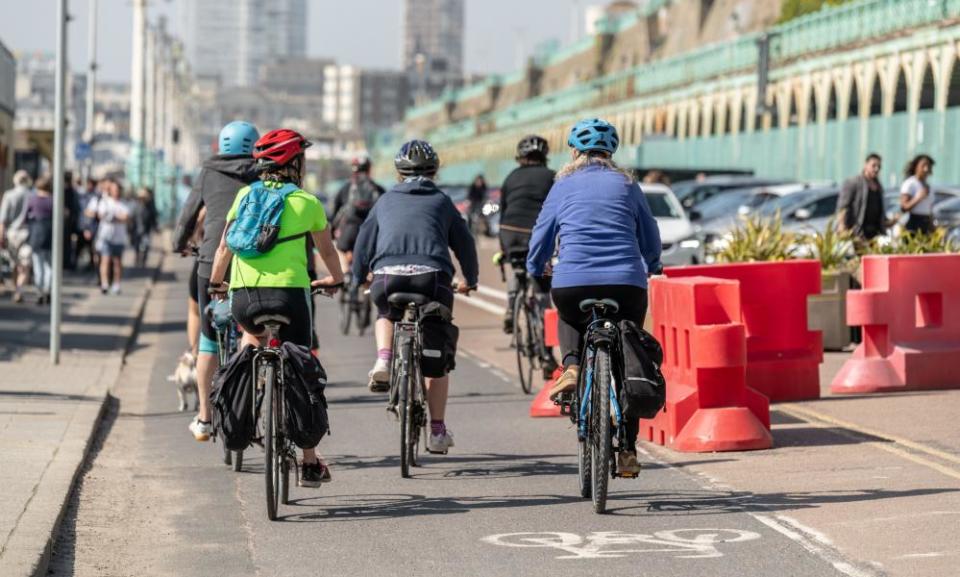Hastily abandoned low-traffic schemes could cost councils funding

Councils which rip out cycle lanes or low-traffic neighbourhoods before giving them a chance to work or without evidence they are failing could lose future central government funding, ministers have warned.
In a sign of the growing frustration within government at some councils, both Conservative and Labour, which have removed active travel schemes in the face of sometimes noisy objections, transport minister Chris Heaton-Harris is formally writing to the leaders of all English local authorities with transport responsibilities.
In separate comments, Boris Johnson warned councils that he was serious about boosting active travel, saying that “trying to squeeze more cars and delivery vans on the same roads and hoping for the best is not going to work”.
“I support councils, of all parties, which are trying to promote cycling and bus use,” the prime minister said. “And if you are going to oppose these schemes, you must tell us what your alternative is.”
Heaton-Harris’s letter, being sent on Friday, warns councils that if schemes installed using central government money, such as funds provided to boost walking and cycling during Covid, are then hastily abandoned, this could affect future grants.
“Premature removal of schemes carries implications for the management of the public money used in these schemes and for the government’s future funding relationship with the authorities responsible,” wrote Heaton-Harris.
Related: Low-traffic schemes halve number of road injuries, study shows
“The department will continue to assess authorities’ performance in delivering schemes and, following the precedent we have already set, those which have prematurely removed or weakened such schemes should expect to receive a reduced level of funding.”
Under the government’s emergency active travel fund, councils installed hundreds of cycle lanes, school streets and low-traffic neighbourhoods (LTNs), which seek to filter residential streets against through-traffic by motor vehicles.
However, amid often noisy objections from some residents, plus repeatedly negative media coverage of such interventions, a series of councils have removed schemes at short notice.
Conservative-run West Sussex council has already been told it cannot apply for the next phase of active travel funding after it removed a cycle lane in Shoreham-by-Sea. Similar lanes have been taken out by Labour-led Liverpool council, and by an alliance of Labour and Tory members in Brighton.
Some councils have also removed LTNs, such as Ealing in west London, although the funding for this came from Transport for London rather than central government.
In the letter, Heaton-Harris warns council leaders to make sure any decisions are made on the basis of evidence: “We have no interest in requiring councils to keep schemes which are proven not to work, but that proof must be presented. Schemes must not be removed prematurely, or without proper evidence and too soon to collect proper evidence about their effects.”
It comes as newly released government-commissioned polling showed apparent strong public support for LTNs, and for wider traffic reduction measures.
The research, carried out in Birmingham, Ipswich, Bournemouth and Salford, showed 61% of people supported their local LTN, including 58% of business owners and 49% of those with mobility challenges.
More generally, 79% of people backed the reduction of traffic in their local area, with 71% support for respondents with mobility challenges.
In his comments, Johnson directly tackled the charge from opponents of LTNs and similar schemes that they simply move traffic to other roads, saying: “Of course some journeys by car are essential, but traffic is not a force of nature. It is a product of people’s choices. If you make it easier and safer to walk and cycle, more people choose to walk and cycle instead of driving, and the traffic falls overall.”
Related: The evidence is in: low-traffic neighbourhoods are popular
The letter and Johnson’s statement emphasise the apparent policy difference divide over active travel between some councils and the more positive view within Downing Street and the Department for Transport.
Duncan Dollimore, head of campaigns for Cycling UK, said the organisation had been arguing for months that councils should give schemes enough time to work.
He said: “It’s tragic that the Department for Transport has had to issue revised guidance to reinforce this obvious point, and councils in Liverpool, Brighton and elsewhere, who’ve decided in recent days to remove cycle lanes without proper evaluation, need to urgently review those plans.”

 Yahoo News
Yahoo News 